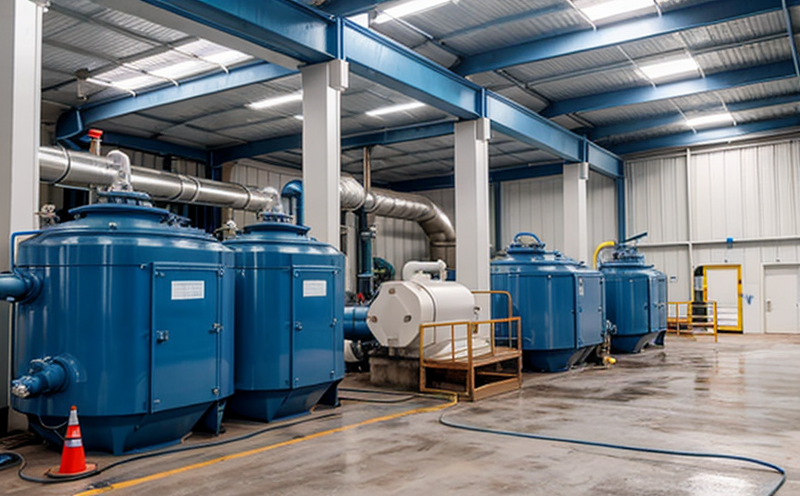ASTM D5465 Dechlorination Testing of Treated Water
The ASTM D5465 standard is pivotal in ensuring that ballast water and wastewater treatment systems effectively dechlorinate treated water. This service focuses on the rigorous testing required to meet regulatory standards, particularly for vessels operating under the International Maritime Organization (IMO)'s Ballast Water Management Convention. Ensuring compliance with these stringent regulations is critical for avoiding potential penalties and maintaining the reputation of your organization.
The ASTM D5465 protocol involves a series of steps designed to measure residual chlorine in treated water after it has passed through a dechlorination process. This service ensures that the water meets the specified maximum levels of free and combined chlorine, which are critical for preventing harm to aquatic ecosystems when discharged into bodies of water.
Our laboratory adheres strictly to ASTM D5465 guidelines, using state-of-the-art analytical equipment such as potentiometric titrators and UV-visible spectrophotometers. These instruments provide precise and accurate measurements, ensuring that the treated water is safe for discharge. The testing process begins with the collection of a representative sample from the treatment system’s effluent line.
Following sample collection, the laboratory conducts an initial assessment to determine the baseline chlorine levels present in the raw untreated water. This step is crucial as it allows us to understand the dechlorination efficiency achieved by the treatment system. Next, we perform the dechlorination test according to ASTM D5465 procedures.
The testing process involves titrating the treated water with sodium thiosulfate solution until all free and combined chlorine has been reduced to chloride ions. This step is critical as it ensures that the treated water does not pose a risk of recontamination or harm upon discharge. After dechlorination, we measure the residual chlorine levels again to assess the effectiveness of the treatment process.
The results of these tests are then compared against the specified limits outlined in ASTM D5465. If the treated water fails to meet the standards, our team works closely with your organization’s R&D engineers and compliance officers to identify potential issues within the treatment system and recommend corrective actions. This collaborative approach ensures that you receive actionable insights leading to continuous improvement of your systems.
Our commitment to excellence extends beyond mere compliance; we strive to provide comprehensive testing solutions tailored specifically to meet the unique needs of marine and ship equipment testing sectors. By leveraging our expertise in ASTM D5465 dechlorination testing, you can rest assured that your vessels are equipped with compliant ballast water and wastewater treatment systems capable of protecting both human health and aquatic environments.
Quality and Reliability Assurance
At our laboratory, we place a strong emphasis on quality and reliability assurance in all aspects of our services. For ASTM D5465 dechlorination testing, this commitment translates into meticulous attention to detail throughout every stage of the testing process—from sample collection to final analysis.
- Sample Collection: Our trained technicians ensure that samples are collected under controlled conditions to avoid any contamination or degradation of the water quality. This ensures accurate and reliable test results.
- Analytical Equipment: We use advanced analytical instruments calibrated regularly against international standards to guarantee precision and accuracy in our measurements.
- Data Validation: All data generated during testing is cross-validated using multiple methods to ensure consistency and reliability. Any discrepancies are promptly addressed through retesting or corrective measures.
We maintain a robust quality management system that complies with ISO 17025, ensuring that our laboratory practices meet the highest industry standards for accuracy, precision, and traceability. Our dedicated team of experts is committed to providing you with accurate, reliable results every time, thereby fostering trust and confidence in your testing outcomes.
Customer Impact and Satisfaction
- Regulatory Compliance: Ensuring that treated water meets ASTM D5465 standards helps ship operators avoid penalties associated with non-compliance. This can lead to cost savings in the long run.
- Enhanced Reputation: Adherence to regulatory requirements enhances your organization’s reputation, promoting trust and confidence among stakeholders.
- Risk Mitigation: By identifying potential issues early through our testing services, you mitigate risks associated with improper treatment systems or non-compliant practices.
- Informed Decision-Making: Accurate test results enable informed decision-making regarding the performance and maintenance of your ballast water and wastewater treatment systems.
Our customers consistently report high levels of satisfaction, attributing it to our commitment to delivering accurate, reliable, and timely results. We pride ourselves on building long-term relationships based on trust, reliability, and exceptional service.
Use Cases and Application Examples
| Use Case | Description |
|---|---|
| Vessel Compliance Testing | This use case involves testing the treated water from a vessel’s ballast water and wastewater treatment system to ensure it meets ASTM D5465 standards. This is critical for vessels operating under international maritime regulations. |
| R&D Validation | Our service supports R&D engineers in validating the effectiveness of new treatment technologies, ensuring they meet regulatory requirements before commercial deployment. |
| System Maintenance Monitoring | This involves periodic testing to monitor the ongoing performance of a ship’s ballast water and wastewater treatment system. It helps identify any degradation in efficiency over time. |
| Third-Party Audits | In this scenario, our service is used by third-party auditors conducting compliance checks on ships’ treatment systems to ensure they meet regulatory standards. |
These use cases highlight the versatility and importance of ASTM D5465 dechlorination testing in various aspects of marine operations. Our laboratory ensures that these tests are conducted with utmost precision, providing you with valuable insights into your treatment system’s performance.





